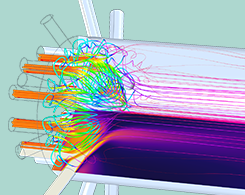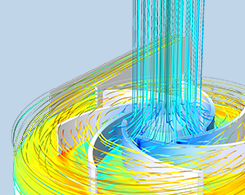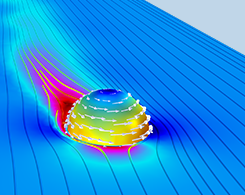Blog Posts Tagged CFD Module

CFD Benchmark: Examining Fluid Flow in a Transonic Diffuser
You can analyze the fluid flow in a transonic diffuser using CFD simulation. Get details in this blog post featuring a benchmark model based on research by M. Sajben et al.

How to Analyze a Glacier via Gradient-Based Optimization
This post highlights a gradient-based optimization method that geophysical engineers can use to analyze, for instance, the movement and sensitivity of a glacier.

Modeling a Tubular Reactor for Optimized Polymer Manufacturing
Chemical engineers can model tubular reactors to optimize them for specific manufacturing and production processes, such as for the polymerization of polyester, as this example shows.

Analyzing a Centrifugal Pump Design with Frozen Rotor Approximation
Mechanical engineers can analyze the design of centrifugal pumps using the Frozen Rotor Approximation, which is available in the Mixer Module, an add-on to the CFD Module.

Your Guide to Meshing Techniques for Efficient CFD Modeling
Learn how to use a variety of meshing tools for your CFD analyses, including mapped mesh, unstructured quad mesh, triangular mesh, tetrahedral mesh, swept mesh, boundary layer mesh, and more.

How to Set Up a Mesh in COMSOL Multiphysics® for CFD Analyses
As a flow mechanics specialist preparing a mesh for CFD analysis, the geometry supplied by a CAD team is often exactly what you do not want. So, what do you do?

Does It Matter Which Ball the FIFA World Cup™ Teams Practiced With?
In an attempt to determine what type of soccer ball is best to prepare for the FIFA World Cup™, we set up a backyard experiment involving a leaf blower, level, and a few soccer balls.

Optimizing Combustion Particle Control in an Electric Filter Design
To optimize the design of an electrostatic filter, researchers from Switzerland used multiphysics modeling, validating their results by comparing them to experimental data.
